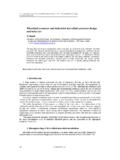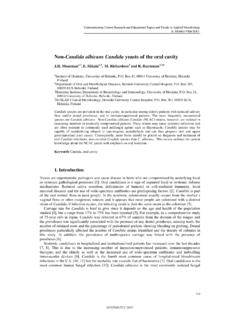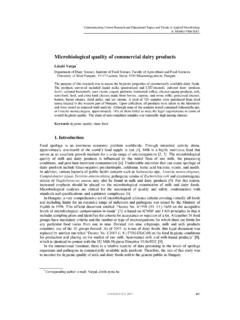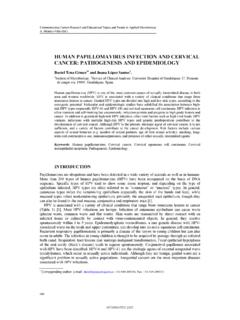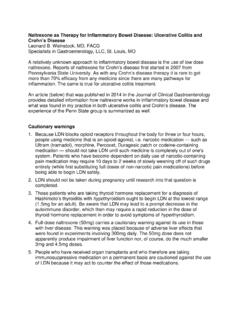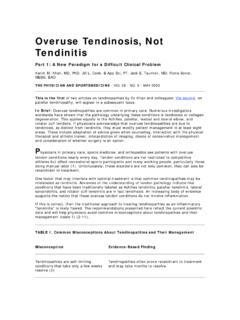Transcription of Role Of Gut Flora In Inflammatory Bowel Disease- …
1 Communicating Current Research and Educational Topics and Trends in Applied Microbiology A. M ndez-Vilas (Ed.). _____. Role Of Gut Flora In Inflammatory Bowel disease - A State Of Art Jaishree Paul*, Anil Kumar Verma and Ravi Verma School of Life Sciences, Jawaharlal Nehru University, New Delhi 110067, India This review helps us to dissect out the underlying mechanism that leads to Inflammatory Bowel diseases (IBDs, which include ulcerative colitis and Crohn's disease ). Two broad line of thoughts have emerged from the study. One body of data suggests that IBD is associated with the genetic make-up of the individual that contributes to evoke the Inflammatory response that characterizes the disease .
2 Another body of data suggests that IBD patients have a defective epithelial barrier that enables the proliferation of non pathologic organisms in close juxtaposition to elements of the mucosal immune system, again evoking the Inflammatory response that characterizes the disease . Keywords: Gut microbiota; Ulcerative colitis; Crohn's disease ; Sulphate reducing bacteria; leaky gut;. probiotics; molecular techniques 1. Introduction There has been a marked resurgence of interest in the gastrointestinal commensal Flora and host microbe interactions.
3 This has been generated due to the recognition of the role of intestinal bacteria in the pathogenesis of several intestinal disorders, including Crohn's disease , ulcerative colitis and colorectal renewed interest in the Flora has also been prompted by increasing evidences of the potential health benefit of therapeutic manipulation of the microenvironment with probiotics during disease condition. We also have started understanding the role of the gut Flora in intestinal development, mucosal defence and the relevance of commensal Flora on the emerging global problem of antibiotic resistance.
4 Co-evolution of the host and gut Flora implies mutually beneficial interactions. Survival of the host requires, however, that the bacterial residents within the human to be contained, without excessive immune reactivity, while retaining the capacity for an effective immune response to challenges posed by pathogens. This is maintained by a precise regulation of the microenvironment [1]. Any disruption of these processes may lead to inappropriate response and chronic Inflammatory disease . Many clinical and experimental intestinal Inflammatory reactions have been attributed to immune recognition of the intestinal microflora.
5 We intend here to present an overview on the state of the gut Flora during IBD, its probable role in modulating immune response during disease and therapeutic strategies tried to manipulate the Flora . 2. Landmarks achieved so far in IBD research Regarding the pathogenesis of IBD, it is recognized that immune tolerance is the normal state of the intestinal immune system. Secondly, it is also understood that a wide variety of cell types are orchestrated in a tightly regulated fashion to maintain immunologic tolerance. Thirdly, the intestinal Flora is a key ingredient in the abnormal immune response of IBD and the genetic factors predispose individuals to an abnormal immune response to the Flora .
6 Finally, it is recognized that both innate and adaptive immune responses play integrated roles in the homeostasis of the intestinal mucosal response [2]. The normal individuals has the ability to control gut inflammation whereas, individuals susceptible to IBD tend to enter a state of uncontrolled and chronic inflammation with failure to down regulate the inflammation caused by the insult. *. Corresponding author: email: Phone: 91-11-26704156. 705. FORMATEX 2007. Communicating Current Research and Educational Topics and Trends in Applied Microbiology A.
7 M ndez-Vilas (Ed.). _____. 3. Role of bacteria in Pathogenesis of IBD. The pathogenesis of Inflammatory Bowel disease involves interactions between the host susceptibility, mucosal immunity and intestinal microflora. There is therefore great interest in the changes in the endogenous Flora in Inflammatory Bowel disease patients and in the establishment of potential genetic variations in host responses to endogenous bacteria. In this review, we summarize the modifications in the various regional ecosystems in the gastrointestinal tract during Inflammatory Bowel disease (luminal bacteria in faeces or inside the gastrointestinal tract, bacteria in mucus and bacteria directly attached to the mucosa).
8 Earlier results were obtained following a 'candidate microorganism strategy' and, as is occurring increasingly frequently, following a 'full description strategy', which has progressed largely due to the development of culture-independent techniques. Faecal microbiota In humans, the composition of the Flora in an individual is stable, but differs between the stomach and upper Bowel , lower small Bowel , right colon and rectum. Moreover, the Flora recovered from faeces is also different from mucosa-associated or intraepithelial Flora .[3] The resident microbiota has a critical role in modulating the immune response of the gut as well as in the initiation and perpetuation of IBD.
9 In the normal host, the protective cell-mediated and humoral immune responses to enteropathogenic microorganisms are allowed to proceed, whereas responses to microorganisms of the indigenous Flora are prevented. Differently, under conditions of chronic intestinal inflammation, this homeostasis seems to be disrupted, and the commensal Flora seem to act as a surrogate bacterial pathogen: the lifelong inflammation in chronic IBD occurs because the host response is unable to eliminate the Flora [4]. Several lines of evidence in adults and in various animal models emphasise the role of the endogenous normal intestinal microflora in the aetiology of IBD.
10 A study by Rath et al, (2001) convincingly reveals an important but complex effect of luminal bacteria in the acute phase as well as the chronic phase of experimental colitis. The present results in conjunction with their previous observations strongly support the following hypotheses (i) Normal luminal bacteria are required for development of chronic immune-mediated intestinal inflammation. (ii) Commensal enteric bacterial species have unequal proinflammatory capabilities, with some being more aggressive than others. (iii) Various endogenous bacteria have different roles in the Inflammatory process.
